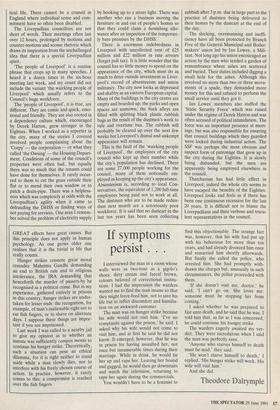If symptoms persist . . .
GREAT effects have great causes. But this principle does not apply in human psychology. As one grows older one realises that it is the trivial in life that really counts.
Hunger strikes connote great moral crusades: Mahatma Gandhi demanding an end to British rule and to religious intolerance, the IRA demanding that henceforth the murder of passers-by be recognised as a political crime. But in my experience, gathered entirely in prisons in this country, hunger strikes are under- taken for lesser ends: the recognition, for example, of man's inalienable right not to eat fish fingers, or to shave on alternate days. I suppose these things are impor- tant if you are imprisoned. Last week I was called to a nearby jail to give my opinion as to whether an inmate was sufficiently compos mentis to continue his hunger strike. Theoretically, such a situation can pose an ethical dilemma, for it is right neither to stand aside while a man slowly dies, nor to interfere with his freely chosen course of action. In practice, however, it rarely comes to this: a compromise is reached over the fish fingers. I interviewed the man in a room whose walls were as two-tone as a gigolo's shoes: dirty cream and faecal brown, colours beloved of correctional institu- tions. I had the impression the warders wanted me to find the man insane so that they might force-feed him, not to save his life but to inflict discomfort and humilia- tion on an awkward customer.
The man was on hunger strike because his wife would not visit him. 'I've no complaints against the prison,' he said. I asked why his wife would not come to visit him, and at first he said he did not know. It emerged, however, that he was in prison for having assaulted her, not once but innumerable times during their marriage. While in drink, he would tie her up and rape her. Leaving her bound and gagged, he would then go downstairs and watch the television, returning to rape her again during the commercials.
You wouldn't have to be a feminist to find this objectionable. The strange fact was, however, that his wife had put up with his behaviour for more than ten years, and had already divorced him once and remarried him shortly afterwards. But finally she called the police, who arrested him. She had promptly with- drawn the charges but, unusually in such circumstances, the police proceeded with them.
`If she doesn't visit me, doctor,' he said, 'I can't go on. She loves me: someone must be stopping her from coming.'
I asked whether he was prepared to fast unto death, and he said that he was. I told him that, as far as I was concerned, he could continue his hunger strike.
The warders eagerly awaited my ver- dict. They were incredulous when I said the man was perfectly sane.
`Anyone who starves himself to death must be mad,' they said.
`He won't starve himself to death,' I replied. 'His hunger strike will work. His wife will visit him.'
And she did.
Theodore Dalrymple


















































 Previous page
Previous page